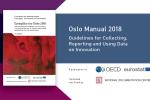
The participation of women in the field of Research & Development in Greece is presented in a new publication (in Greek) from the National Documentation Centre (EKT). The EKT study, with detailed data and indicators, records the position and participation of women in the field of R&D, not only in academia, research and business, but also in European and nationally funded research projects.
Since 2007, EKT has been actively serving the goal of gender equality by participating in research projects that highlight the gender dimension of the Research, Technology, Innovation sector and at the supranational level. In addition, the main related field in which EKT operates is the production of statistics to capture the national research and innovation system, recording the position of young researchers and highlighting their achievements. EKT monitors and records the relevant national statistics that it produces on an annual basis, including the participation of women in Research and Development activities. It is also the statistical representative of Greece for the related EU publication, SHE figures.
The data from the recent European edition of She Figures 2021, to which EKT contributed with the corresponding national statistics, reflect the progress of women from their studies, their specialisation and through their careers to the high positions of responsibility they reach. Despite the exceptions and successful examples from women academics or entrepreneurs, the ’glass ceiling’ remains, keeping women in lower positions, with less responsibility. Equal opportunities and the non-standard treatment of women remain central issues in industries where men have traditionally excelled such as the IT sector. Moreover, the strengthening of digital skills raises the issue of women lagging behind, if not being excluded from, the modern technological developments that define the digital economy, entrepreneurship and society.
Some interesting findings of EKT’s new publication ‘The participation of women in Research & Development in Greece. Edition 2021’ can be summarised as follows:
- Female doctorate holders make up 49.3% of the total number of doctorate holders in 2020.
- The highest participation of women is recorded in the Social Sciences (58.0%), followed by the Humanities and Arts (55.6%), Agricultural Sciences and Veterinary Medicine (52.4%) (2020 data).
- The total number of staff employed in R&D in Greece amounts to 103,525 people, with 45,001 being women (43.5% of the total staff) (2019 data).
- High percentages (over 50%) for women are recorded for actions supporting PhD candidates, postdoctorates and young researchers, funded nationally by the European Social Fund in the years 2016-2021. However, their participation in the activities of young researchers funded by the EU in the period 2014-2020 through funding programmes such as that of the European Research Council and the actions of Marie Skłodowska-Curie is lower (37.9% & 27.6 % respectively).
Participation of women as young doctorate holders
For the year 2020, female doctorate holders up to 35 years of age constitute 41.2% of all female doctorate holders with 35.2% being women between 36-44 years old (Figure 1) Respectively, men up to 35 years old constitute 40.0% of the total number of male doctorate holders, while 35.7% are in the 36-44 years old age group. Similar percentages are noted for the remaining years under consideration, ie 2017 to 2019.
Based on the statistical data of the doctorate holders who were awarded a doctorate by a Greek university, the following figure lists the shares of women doctorate holders by scientific field 1 for the years 2017-2020. Indicatively, for 2020 the highest participation of women is recorded in the scientific field of Social Sciences (58.0%), followed by Humanities and Arts (55.6%), and Agricultural Sciences and Veterinary Medicine (52.4%). The lowest participation is recorded in the fields of Natural Sciences (44.2%) and Engineering and Technology (34.6%). Over time, the percentages of the six main scientific fields do not change significantly per year, except in the cases of Natural Sciences (42.1% in 2017 and 50.3% in 2019) and Agricultural Sciences (46.5% in 2017 and 57, 9% in 2019).
Participation of women in Research and Development personnel
According to official statistics for 2019, the total staff employed in R&D in Greece amounts to 103,525 people. Of these, 45,001 are women, with a percentage of 43.5 Based on this percentage, Greece is ranked 7th among the EU27 countries and the United Kingdom.
More specifically, in the higher education sector, a total of 24,805 women are employed in R& D activities (researchers and other staff) and constitute 48.3% of the total R& D personnel in the sector. The public sector employs 12,971 women (43.7% of the total R&D personnel in the sector) while the business sector employs 6,843 women (31.4% of the total R&D personnel in the sector). The number of women employed in the private non-profit sector is 382 (53.9% of the total R&D personnel in the sector).
Participation of women in research projects and actions
Horizon 2020 is the European Union’s largest research and innovation programme with € 80 billion in funding for the period 2014-2020. Among Horizon 2020 actions, European Research Council (ERC) funding and Marie Skłodowska-Curie (MSCA) funding are of particular interest as they fund projects of high scientific excellence implemented either by individual researchers or by research teams with a ‘lead researcher’.
During the period 2014-2020, 145 Greek proposals/scholarships were funded in Greece, of which 40 were women. Over time, the participation rate of women is 27.6%, with variations per year.
Respectively, for the actions of Marie Sklodowska Curie (MSCA), Figure 4.2 presents the distribution of Greek scholarship holders for the years 2014 -2020. A total of 1,637 scholarships from Greece were funded during this period, of which 1,016 were for women. The overall participation rate of women for the period is higher than that of the ERC, reaching 37.9%.
In addition to European projects, data are also available on the performance of women in a number of national actions to support researchers in the period 2016-2021. These actions relate to the interventions of the European Social Fund for the support of young scientists and researchers and are funded by the Operational Programme ‘Human Resources Development, Education & Lifelong Learning’ NSRF 2014-2020.
In the case of support projects for young researchers, women recorded higher participation rates, with the most typical example being support actions for PhD candidates, where the share reaches 60.5%. In the case of actions to enhance teaching experience, women lag behind men in all academic years under consideration.
The publication ‘Women’s participation in Research & Development in Greece - Edition 2021’ uses data and indicators derived from official statistics produced by EKT, in particular expenditure and personnel statistics on Research and Development and statistics on doctorate holders.
It also presents data on the participation of women in European research projects, collected by EKT as part of its operation as the National Contact Point in Horizon 2020, and data on the participation of women in national research projects, collected by EKT in the context of implementation of the Action ‘Evaluation of NSRF actions in Higher Education’ for the monitoring of actions in support of young scientists and researchers.















